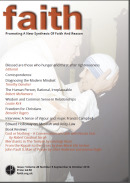Book Reviews: The Voice of African Catholicism
God or Nothing – A Conversation on Faith with Nicolas Diat
by Robert Cardinal Sarah, Ignatius Press, 284 pp, £12.1. Available via Gracewing.
Reviewed by Mark Vickers
‘I have read God or Nothing with great spiritual profit, joy and gratitude . . . All that you have written regarding the centrality of God, the celebration of the liturgy, the moral life of Christians is especially relevant and profound.’ Not the opinion of your humble reviewer, but the words of Pope Emeritus Benedict XVI. With such an accolade, we appreciate that this is no ordinary work.
Indeed, it consciously emulates the format and content of the book-length interviews conducted by Vittorio Messori and Peter Seewald in the 1980s and 1990s which placed the person and thought of Joseph, Cardinal Ratzinger so sympathetically in the limelight. The style is similar: autobiographical material interwoven with forthright reflection upon the Church and the world.
Cardinal Sarah’s indebtedness to Pope Emeritus Benedict is acknowledged at every point: ‘If we are seeking the truth, Benedict XVI is an exceptional guide. If we prefer lies, silence and omissions, Benedict XVI becomes an unacceptable problem’ (p. 96). Both men share the same concern for the primacy of God and prayer, the same intent to defend the beauty of the liturgy and the truth of the Faith. Yet, while with Pope Benedict, one easily imagines oneself at the feet of one of the great Fathers of the Church, Robert Sarah takes us back to an earlier age, an age of martyrs, an age when there is a freshness and vitality to the faith.
Ordained at a time of chaos
The future Cardinal was born into a family of modest farmers in a remote Guinea in 1945. His father only converted to Christianity two years later, when he had his son baptised. Again, he is quick to acknowledge West Africa’s debt to the French Spiritan Fathers, who brought the Gospel to his people at the cost of health and life. Inspired by their disciplined spiritual life, Sarah discerned his vocation to priesthood. Ordained in 1969 at a time of chaos, he recognises the role of daily Mass in his own priestly life: ‘without the Eucharist, my relationship with Christ could not achieve the great intimacy that every Christian desires’ (p. 50).
After a challenging period as seminary rector, he was appointed by Paul VI as the world’s youngest bishop. Guinea was suffering greatly under a Marxist dictatorship. Sarah himself was under surveillance but remained fearless, promoting Catholic families, education and catechesis, speaking out courageously. He relates what it was that sustained him: ‘I think that a bishop, in order to fulfil his role, must do penance, fast, listen to the Lord and pray for long periods in silence and solitude’ (p. 70). He escaped execution only due to the president’s ill health and his own departure from Guinea – a painful ordeal for him. ‘During those first months in Rome, I felt like an uprooted tree’ (p. 255).
Recognising the danger to his life if he remained in Guinea, John Paul II appointed Sarah Secretary of the Congregation for the Evangelisation of Peoples in 2001. In 2010 Benedict XVI created him cardinal and head of Cor Unum, directing the Church’s charitable work. The Pope told him why: ‘I appointed you because you have the experience of suffering and of the face of poverty.’
The botched preparation of liturgical reform
Pope Francis’s appointment of Cardinal Sarah as Prefect of the Congregation for Divine Worship in 2014 was perhaps even more surprising. However, the African has always had a deep love of the liturgy, especially as experienced in the Benedictine houses to which he felt drawn. He has strong criticism of ‘the botched preparation for the liturgical reform’ which followed the Council, and its ‘devastating effects on the Catholic population’ (p. 84). Sarah denounces the use of liturgy as entertainment: ‘the faithful go back home, after the celebration of the Eucharist, without having encountered God personally or having heard Him in the inmost depths of their heart’ (p. 105). Traditionalism by itself, however, is insufficient. ‘If a person respects the ancient rites of the Church but is not in love, that individual is perishing’ (p. 125).
Sarah is a considerable scholar with an impressive grasp of the breadth of the Christian tradition. Yet there is relatively little engagement with contemporary intellectual issues. He has no difficulties with the findings of modern science, which ‘should bring man closer to divine love’ (p. 168). Yet, one senses, faced with persecution and poverty, engagement with the abstract is limited.
Never afraid to confront mediocrity
Like Pope Francis, Cardinal Sarah speaks with great frankness. He admires the current Holy Father’s condemnation of careerism and worldliness in the Church. The interview arrives at the current day and reaches a crescendo with the Synod on the Family. There is clarity and authority: ‘I solemnly state that the Church in Africa is staunchly opposed to any rebellion against the teaching of Jesus and the Magisterium’ (p. 277).
The only (minor) quibble is with the occasional over-lengthy quotation from papal writings or Church documents. This is out of place in an interview format. Cardinal Sarah speaks most powerfully when he speaks personally.
This book cannot be recommended too highly. It takes us all beyond our comfort zones. Sarah is never afraid to confront mediocrity under any guise. His own experience of suffering, his utter rootedness in prayer, allow him to do so with authenticity. ‘Both the clergy and the laity today are in urgent need of conversion,’ he challenges us (p. 150). In a Western world which is so self-referential, all of us can benefit from listening to this voice of African Catholicism. As his interviewer states, here is ‘a priest who never tires of speaking about the God he loves’ (p. 12).
Notes:
Fr Mark Vickers is a priest of the Diocese of Westminster and the parish priest of Holy Ghost & St Stephen, Shepherd’s Bush






